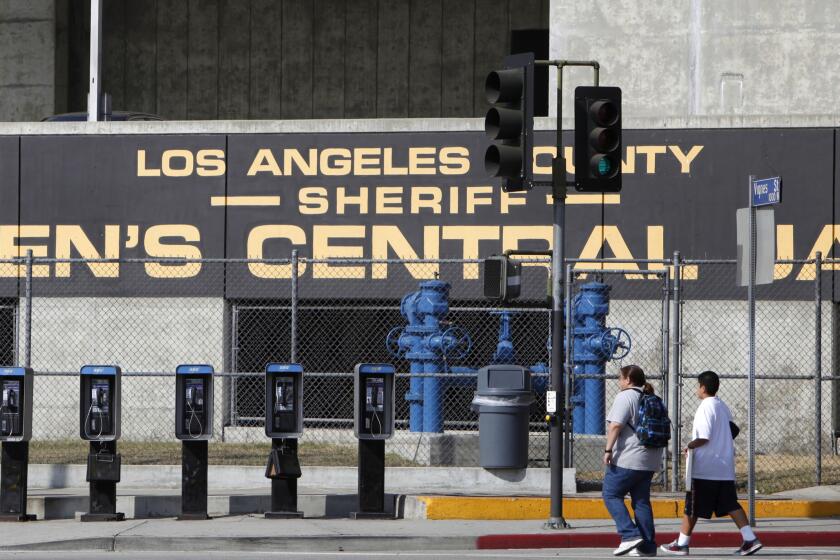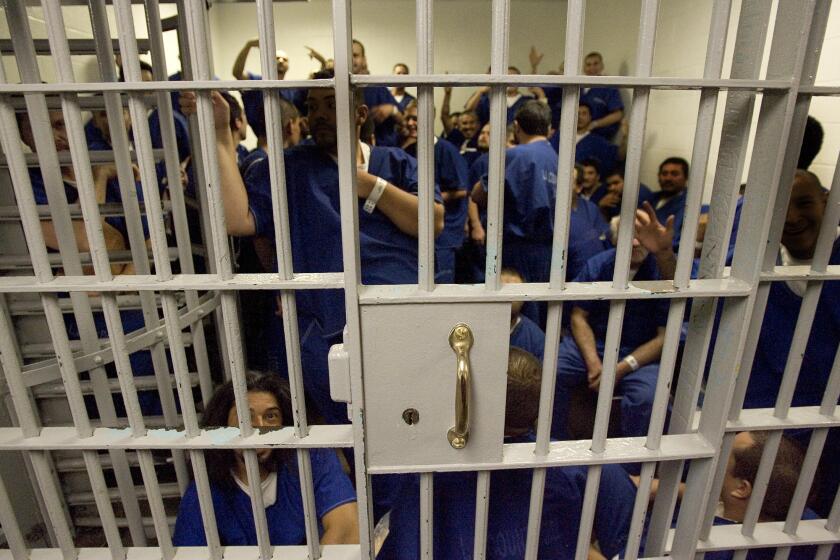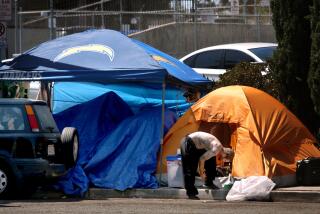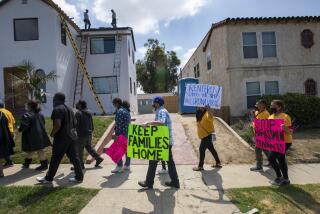Editorial: Leaders aren’t leading on L.A. bail reform
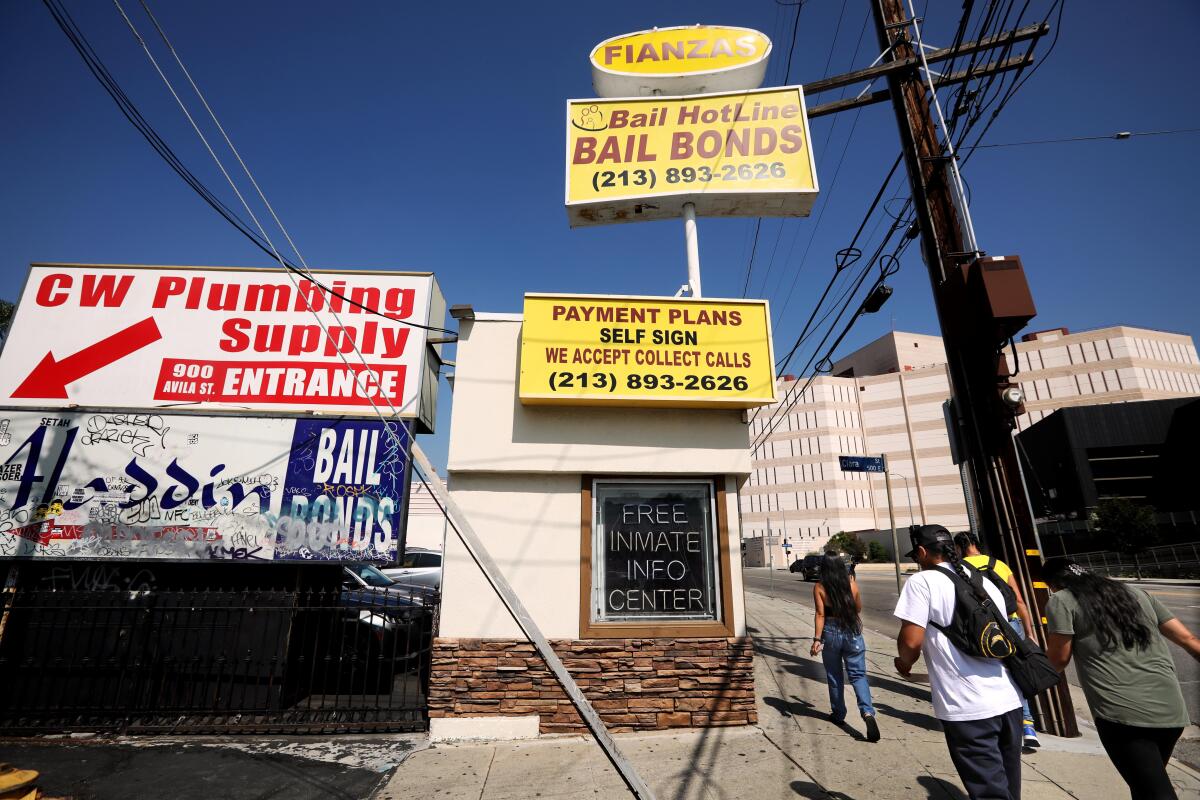
- Share via
Eliminating money bail has been a front-burner issue in Los Angeles County ever since the 2012 district attorney campaign when reform advocates compelled candidates to discuss the topic at debates.
The Board of Supervisors made it a priority in 2017, and together with the L.A. County Superior Court it accepted a $17.3-million state grant to run a pilot pretrial release program in 2020. The program coincided with COVID-19 and the emergency order to release defendants without paying bail in order to stop the spread of disease in jails. The program was a success. The number of defendants who were arrested again while awaiting trial dropped.
What L.A. needs now, as the court’s new pre-arraignment release program begins Sunday, is for local leaders to proudly stand behind bail reform, speak out against the fear-mongering by police and the bail bond industry, spotlight the studies that overwhelmingly show communities are safer without money bail, cheer on the Superior Court program and offer helpful suggestions for improving it.
On Oct. 1 Los Angeles County transitions to a new way of administering pre-arraignment justice that doesn’t use cash bail for most crimes.
Yet judging from Tuesday’s board discussion on the court’s new procedures to eliminate most money bail, you’d think the supervisors, the sheriff and some top county staff had never heard of the idea.
The program is “alarming,” Sheriff Robert Luna said, because of a “lack of consequences for those who commit crimes.” No, there are consequences for crime, court Executive Officer David Slayton said — after perpetrators are convicted.
The argument that money bail “holds people accountable” or imposes “consequences” for alleged crimes is an admission that the system is used to punish people who have been arrested but not convicted. That violates the Constitution.
If you don’t like a program that will prevent people accused of nonviolent crimes from being held in custody, Supervisor Holly Mitchell asked Luna, what are you going to do about the overcrowding in your jails? You mean our jails, Luna responded, adding that it would be nice to have all those alternatives to incarceration that the board has promised for defendants with substance use and mental health problems.
The discussion went on in that vein, with finger pointing between the district attorney’s office, the supervisors, the sheriff, Slayton and county staff. There was confusion over who is responsible for funding and providing pretrial programs, and whether they are voluntary or mandatory. There was jockeying over who gets the blame if things go wrong.
Neither should anyone else. Cash bail is profoundly unjust for people facing criminal charges who don’t have money, and a pointless ritual for people, like the former president, who do.
“The courts decided this and the Legislature decided this,” Supervisor Hilda Solis lamented. “We didn’t decide this.”
But the county did decide this, at least in concept, six years ago.
Mitchell was right to point out the inherent bias in feeling threatened by people who are released on zero-dollar bail but not those set free merely because they could pay. People should be held because they are dangerous, not because they lack cash. We need more reminders like that from our leaders. A little bit louder and a little more often, please.
L.A. officials knew the bail schedules they used to lock people up before trial were unjust, but they didn’t act. Now a ruling will force them to do so.
Police generally oppose pretrial release because they understandably presume the suspects they arrest are guilty, and want to see them “held accountable” — punished — right away, with bail or jail. They have an opportunity to undermine the new program by requesting detention of every suspect who might otherwise be released before arraignment.
But police are only the front end of a criminal justice system that affords defendants a presumption of innocence until they are proven guilty beyond a reasonable doubt in court and equal protection of law whether or not they have money. Furthermore, a trove of data show that use of money bail increases the chance of crime, instead of the other way around. It falls to elected officials to vocally defend the integrity of the justice system and promote real public safety.
With statewide efforts having been stymied for now at the ballot box, it is more important than ever for Los Angeles County to take its own path.
That includes L.A. Mayor Karen Bass.
The mayor has no formal role in money bail and was not at Tuesday’s supervisors meeting. But in Congress, Bass held hearings on the unfairness, racial inequity and danger of money bail systems. In the same way that she saw an opportunity to make progress on drug treatment, homeless services and other issues usually handled by the county, Bass ought to speak out in defense of eliminating money bail in L.A.
If not her, and not the supervisors, who? And if not now, when?
More to Read
A cure for the common opinion
Get thought-provoking perspectives with our weekly newsletter.
You may occasionally receive promotional content from the Los Angeles Times.
